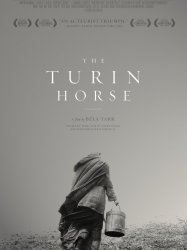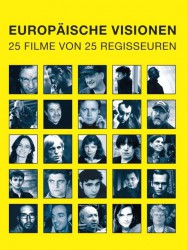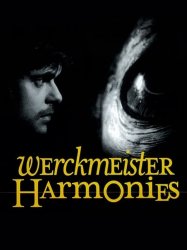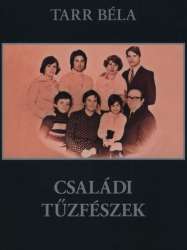Béla Tarr is a Actor, Director, Scriptwriter and Associate Producer Hongrois born on 21 july 1955 at Pécs (Hongrie)

Béla Tarr (born July 21, 1955) is a Hungarian film director.
C'est avec une adaptation de Macbeth pour la télévision en 1982 que sa façon de filmer va vraiment changer : le film ne comportant que 2 plans, le premier (avant le générique) de 5 minutes, le second de 67 minutes.
La sensibilité de Tarr porte aussi bien sur les plans très serrés que sur des compositions abstraites ou de longues prises. Au fur et à mesure, il personnalise sa manière de filmer qui traduit initialement l'empreinte de Miklós Jancsó : durée dilatée, noir et blanc stylisé, mouvements d'appareil complexes, plans séquences sophistiqués, confusion des espaces… Sur le fond, il passe d'une description psychologique et sociale réaliste à une quête métaphysique et allégorique proche d'Andreï Tarkovski. Cependant, Tarr se définit comme athée et sa vision du monde est marquée par un profond pessimisme. Contrairement aux films de Tarkovski où l'espoir d'un ailleurs spirituel est possible, le cinéaste réfute toute idée de grâce salvatrice.
En 1984, sous l'influence de Rainer Werner Fassbinder qu'il vient de découvrir, il tourne Őszi almanach (Almanach d'automne), son dernier film en couleur… En 1987, Damnation (Kárhozat) marque sa première collaboration avec le scénariste et romancier László Krasznahorkai dont les préoccupations mystiques et la représentation cosmogonique influencent ses futures réalisations. Dès lors, le réalisateur radicalise sa démarche artistique : il opacifie le contour de ses personnages et déréalise l'intrigue de ses films, ancrés de prime abord dans un cadre spécifiquement hongrois.
La collaboration avec Krasznahorkai se poursuit : Tarr met sept ans pour adapter le roman de ce dernier, Le Tango de Satan, dont il tire un chef-d'œuvre de 415 minutes. Le film sort en 1994. Malgré les difficultés de production et de distribution, l'œuvre est encensée internationalement. Pour mener à bien la réalisation des Harmonies Werckmeister, sorti en 2000 et également adapté d'un roman de Krasznahorkai ( Mélancolie de la Résistance), il met plusieurs années pour réunir le financement nécessaire et boucler le plan de tournage. Le film, dernière partie du triptyque commencé par Damnation, est acclamé par la critique et connaît un brillant parcours en festivals. En 2004, il réalise le court-métrage Prologue (Visions of Europe).
En 2003, The Guardian le classe 13e dans la liste des 40 meilleurs réalisateurs contemporains.
Pour la plupart de ses films, Tarr s'entoure de deux fidèles collaborateurs : son épouse pour le travail de script et le montage, et le musicien Mihály Víg (également acteur dans certains de ses films) pour l'ambiance sonore si particulière de ses films.
À partir de 2004, le cinéaste travaille sur un nouveau projet L'Homme de Londres, adapté d'un roman de Georges Simenon. Cependant, le suicide de son producteur Humbert Balsan, en février 2005, retarde considérablement le projet et le tournage démarré à Bastia, en Corse. Le film arrive à être achevé et participe à la compétition du Festival de Cannes 2007.
En février 2011, Tarr présente Le Cheval de Turin (A Torinói ló) à la 61e Berlinale. Cette fable sur la fin du monde y reçoit l'Ours d'argent. Elle est, selon ses propres dires, son ultime réalisation pour plusieurs raisons : il pense que le public ne veut plus de ce cinéma-là et que le processus de production devient de plus en plus difficile en Hongrie, mais surtout, il a le sentiment d'avoir dit tout ce qu'il avait à dire sur un plan métaphysique et refuse d'entrer dans un processus ennuyeux de répétition.
Béla Tarr est professeur à la Film Akademie de Berlin depuis 1990.
En 2012, il contribue à fonder un cursus doctoral de cinéma, la Film Factory, au sein de la Faculté de science et technologie de l’Université de Sarajevo.
En décembre 2016, il préside le jury du 16e Festival international du film de Marrakech.
Source : Wikidata
Béla Tarr

Biography
Intéressé à l'art par des parents qui travaillent dans un théâtre, Béla Tarr commence à réaliser des films amateurs à 16 ans. Il continue à se familiariser avec le cinéma en travaillant à la Maison de la Culture et du Divertissement. Son travail lui vaut rapidement l'attention des studios Béla Balázs qui lui offrent la possibilité de mettre en scène son premier long métrage Családi tűzfészek (Nid familial) en 1977, consacré au réalisme socialiste. Ses deux films suivants L'Outsider (Szabadgyalog) en 1981 et Panelkapcsolat (Rapports préfabriqués) en 1982 sont dans la même veine. Entre-temps, Tarr vit de petits métiers et suit des études à l'École supérieure de théâtre et de cinéma de Budapest. Par l'usage de la caméra portée, ses premières œuvres ne s'inscrivent pas dans un mouvement contestataire mais se conçoivent comme des chroniques sans concession sur le quotidien pénible de la Hongrie communiste.C'est avec une adaptation de Macbeth pour la télévision en 1982 que sa façon de filmer va vraiment changer : le film ne comportant que 2 plans, le premier (avant le générique) de 5 minutes, le second de 67 minutes.
La sensibilité de Tarr porte aussi bien sur les plans très serrés que sur des compositions abstraites ou de longues prises. Au fur et à mesure, il personnalise sa manière de filmer qui traduit initialement l'empreinte de Miklós Jancsó : durée dilatée, noir et blanc stylisé, mouvements d'appareil complexes, plans séquences sophistiqués, confusion des espaces… Sur le fond, il passe d'une description psychologique et sociale réaliste à une quête métaphysique et allégorique proche d'Andreï Tarkovski. Cependant, Tarr se définit comme athée et sa vision du monde est marquée par un profond pessimisme. Contrairement aux films de Tarkovski où l'espoir d'un ailleurs spirituel est possible, le cinéaste réfute toute idée de grâce salvatrice.
En 1984, sous l'influence de Rainer Werner Fassbinder qu'il vient de découvrir, il tourne Őszi almanach (Almanach d'automne), son dernier film en couleur… En 1987, Damnation (Kárhozat) marque sa première collaboration avec le scénariste et romancier László Krasznahorkai dont les préoccupations mystiques et la représentation cosmogonique influencent ses futures réalisations. Dès lors, le réalisateur radicalise sa démarche artistique : il opacifie le contour de ses personnages et déréalise l'intrigue de ses films, ancrés de prime abord dans un cadre spécifiquement hongrois.
La collaboration avec Krasznahorkai se poursuit : Tarr met sept ans pour adapter le roman de ce dernier, Le Tango de Satan, dont il tire un chef-d'œuvre de 415 minutes. Le film sort en 1994. Malgré les difficultés de production et de distribution, l'œuvre est encensée internationalement. Pour mener à bien la réalisation des Harmonies Werckmeister, sorti en 2000 et également adapté d'un roman de Krasznahorkai ( Mélancolie de la Résistance), il met plusieurs années pour réunir le financement nécessaire et boucler le plan de tournage. Le film, dernière partie du triptyque commencé par Damnation, est acclamé par la critique et connaît un brillant parcours en festivals. En 2004, il réalise le court-métrage Prologue (Visions of Europe).
En 2003, The Guardian le classe 13e dans la liste des 40 meilleurs réalisateurs contemporains.
Pour la plupart de ses films, Tarr s'entoure de deux fidèles collaborateurs : son épouse pour le travail de script et le montage, et le musicien Mihály Víg (également acteur dans certains de ses films) pour l'ambiance sonore si particulière de ses films.
À partir de 2004, le cinéaste travaille sur un nouveau projet L'Homme de Londres, adapté d'un roman de Georges Simenon. Cependant, le suicide de son producteur Humbert Balsan, en février 2005, retarde considérablement le projet et le tournage démarré à Bastia, en Corse. Le film arrive à être achevé et participe à la compétition du Festival de Cannes 2007.
En février 2011, Tarr présente Le Cheval de Turin (A Torinói ló) à la 61e Berlinale. Cette fable sur la fin du monde y reçoit l'Ours d'argent. Elle est, selon ses propres dires, son ultime réalisation pour plusieurs raisons : il pense que le public ne veut plus de ce cinéma-là et que le processus de production devient de plus en plus difficile en Hongrie, mais surtout, il a le sentiment d'avoir dit tout ce qu'il avait à dire sur un plan métaphysique et refuse d'entrer dans un processus ennuyeux de répétition.
Béla Tarr est professeur à la Film Akademie de Berlin depuis 1990.
En 2012, il contribue à fonder un cursus doctoral de cinéma, la Film Factory, au sein de la Faculté de science et technologie de l’Université de Sarajevo.
En décembre 2016, il préside le jury du 16e Festival international du film de Marrakech.
Usually with
Filmography of Béla Tarr (13 films)
Actor

Season of Monsters (1987)
, 1h40Directed by Miklós Jancsó
Origin Hongrie
Genres Drama
Actors József Madaras, György Cserhalmi, Ferenc Kállai, Júlia Nyakó, Katarzyna Figura, Béla Tarr
Rating62%





Un professeur, Dr. Bardócz, fête son soixantième anniversaire et réunit dans sa maison de vacances ses anciens élèves qui ont construit leur vie en Hongrie ou à l’étranger. Kamondi arrive en dernier avec ses principes égalitaires, il provoque rapidement un conflit entre lui et l’élitiste Kovács. La dispute divise les gens et à l’approche du soir le rassemblement d’amis se transforme de plus en plus à un jeu de mystère étrange où les participants voient les évènements se dérouler sur les écrans de télévisions divers.
Director

The Turin Horse (2011)
, 2h26Directed by Béla Tarr
Origin Hongrie
Genres Drama
Themes Films about animals, Films about horses, Mise en scène d'un mammifère
Actors Volker Spengler, János Derzsi
Rating76%





"In Turin on 3rd January, 1889, Friedrich Nietzsche steps out of the doorway of number six, Via Carlo Alberto. Not far from him, the driver of a hansom cab is having trouble with a stubborn horse. Despite all his urging, the horse refuses to move, whereupon the driver loses his patience and takes his whip to it. Nietzsche comes up to the throng and puts an end to the brutal scene, throwing his arms around the horse’s neck, sobbing. His landlord takes him home, he lies motionless and silent for two days on a divan until he mutters the obligatory last words, 'Mutter, ich bin dumm!' ['Mother, I am stupid!' in German] and lives for another ten years, silent and demented, cared for by his mother and sisters. We do not know what happened to the horse.

The Man from London (2007)
, 2h19Directed by Béla Tarr, László Nemes
Origin Hongrie
Genres Drama, Thriller, Crime
Actors Tilda Swinton, Miroslav Krobot, János Derzsi, Volker Spengler
Rating69%





The film concerns a middle-aged railway pointsman, Maloin (Miroslav Krobot), who lives in a decrepit apartment in a port town with his highly-strung wife Camélia (Tilda Swinton) and his daughter Henriette (Erika Bók). One night while in his viewing tower at the port's rail terminus, Maloin witnesses a fight on the dockside. One of the shady combatants is knocked into the water along with the briefcase he carries; when the other flees the dark quayside, Maloin makes a clandestine descent from the tower and retrieves the briefcase, which he finds full of sodden English banknotes. Maloin conceals the money and tells no-one of what he has seen. The next morning, he visits a tavern where he plays chess with the barkeep (Gyula Pauer). On his way home, he stops by the butcher's where his daughter works, and finds to his indignation that they have her washing the floor. Later, from the window of his apartment, he notices Brown (János Derzsi) watching him from below. At dinner, Maloin is increasingly irascible, addressing Henriette brusquely and arguing with Camélia. Meanwhile Brown searches the water at the dock's edge without success before noticing the watchtower overlooking the quayside, and Maloin within.

Visions of Europe (2004)
Directed by Tony Gatlif, Fatih Akın, Lars von Trier, Peter Greenaway, Aki Kaurismäki, Béla Tarr, Šarūnas Bartas, Martin Šulík, Francesca Comencini, Małgorzata Szumowska, Teresa Villaverde, Barbara Albert, Stijn Coninx, Christoffer Boe, Theo van Gogh, Laila Pakalniņa, Jan Troell, Damjan Kozole, Miguel Hermoso, Constantínos Giánnaris, Andy Bausch, Aisling Walsh
Origin Irlande
Genres Drama, Comedy, Documentary
Actors Henning Moritzen, Cecilie Thomsen, Julija Steponaityte, Marion Lécrivain, Rona Hartner, Tara Elders
Rating57%






Werckmeister Harmonies (2001)
, 2h25Directed by Béla Tarr, Tommy Wiseau
Origin Hongrie
Genres Drama
Actors Hanna Schygulla, Đoko Rosić, János Derzsi, Ferenc Kállai
Rating79%





The film can be seen as an allegory of post-World War II Eastern European political systems - told as a black-and-white cinematic poem with 39 long, single-camera takes. It examines the brutalization of a society, its political systems and ethics through the metaphor of a decaying circus whale and its star performer. It is set in a desolate, isolated small town in Hungary during Soviet times.

Satantango (1994)
, 7h30Directed by Béla Tarr
Origin Hongrie
Genres Drama
Actors Mihály Víg, László Lugossy, Peter Berling, János Derzsi, Ferenc Kállai
Rating81%





In a desolate village, after the collapse of a collective farm, Futaki (Miklós Székely B.) is having an affair with Mrs. Schmidt (Éva Almássy Albert), as he is awakened at dawn by the ringing of church bells, even though the nearest church had been destroyed long ago. Mr. Schmidt (László Lugossy) conspires with a group of co-workers to steal the villagers' money and flee to another part of the country. Futaki ambushes Schmidt and discovers his plans, after which he demands to become part of the scheme—all of this being watched by a lonely drunk man known as the Doctor (Peter Berling), who writes the events down in a notebook. However, the conspiracy is terminated when rumors spread across the village that the charismatic and manipulative Irimiás (Mihály Vig), a former co-worker who had been presumed dead, is returning. Meanwhile, Irimiás and his friend Petrina (Putyi Horváth) make a secret deal with a Hungarian military officer somewhere else that involves his return to the village and manipulation of its community.

Damnation (1988)
, 1h56Directed by Béla Tarr
Origin Hongrie
Genres Drama, Musical, Crime, Romance
Actors György Cserhalmi, Hédi Temessy
Rating75%





Damnation tells the story of Karrer (Miklós B. Székely), a depressed man in love with a married torch singer (Vali Kerekes) from a local bar, the Titanik. The singer broke off their affair, because she dreams of becoming famous. Karrer is offered smuggling work by Willarsky (Gyula Pauer), the bartender at the Titanik. Karrer offers the job to the singer's husband, Sebestyén (György Cserhalmi). This gets him out of the way, but things don't go as Karrer plans. Betrayals follow. Karrer despairs.

Autumn Almanac (1984)
, 2h25Directed by Béla Tarr
Origin Hongrie
Genres Drama
Actors Hédi Temessy, János Derzsi
Rating71%





In a grim, claustrophobic apartment owned by a rich elderly woman, the inhabitants desperately try to relate to each other as they go about their bleak lives revealing their darkest secrets, fears, obsessions and hostilities. They include besides her, her son, her nurse, her nurse's discontented lover, and a new lodger.

The Prefab People (1982)
, 1h42Directed by Béla Tarr
Origin Hongrie
Genres Drama
Actors Róbert Koltai
Rating70%





Le quotidien d'un couple qui s'aime chaque jour un peu moins...

The Outsider (1981)
, 2h26Directed by Béla Tarr
Origin Hongrie
Genres Drama
Rating64%





La descente aux enfers d'un être asocial et alcoolique.

Family Nest (1979)
, 1h48Directed by Béla Tarr
Origin Hongrie
Genres Drama
Rating72%





The film follows a young couple as they live in apartment of the husband's parents, as well as the wife's efforts to find new housing.
Scriptwriter

The Turin Horse (2011)
, 2h26Directed by Béla Tarr
Origin Hongrie
Genres Drama
Themes Films about animals, Films about horses, Mise en scène d'un mammifère
Actors Volker Spengler, János Derzsi
Rating76%





"In Turin on 3rd January, 1889, Friedrich Nietzsche steps out of the doorway of number six, Via Carlo Alberto. Not far from him, the driver of a hansom cab is having trouble with a stubborn horse. Despite all his urging, the horse refuses to move, whereupon the driver loses his patience and takes his whip to it. Nietzsche comes up to the throng and puts an end to the brutal scene, throwing his arms around the horse’s neck, sobbing. His landlord takes him home, he lies motionless and silent for two days on a divan until he mutters the obligatory last words, 'Mutter, ich bin dumm!' ['Mother, I am stupid!' in German] and lives for another ten years, silent and demented, cared for by his mother and sisters. We do not know what happened to the horse.

The Man from London (2007)
, 2h19Directed by Béla Tarr, László Nemes
Origin Hongrie
Genres Drama, Thriller, Crime
Actors Tilda Swinton, Miroslav Krobot, János Derzsi, Volker Spengler
Rating69%





The film concerns a middle-aged railway pointsman, Maloin (Miroslav Krobot), who lives in a decrepit apartment in a port town with his highly-strung wife Camélia (Tilda Swinton) and his daughter Henriette (Erika Bók). One night while in his viewing tower at the port's rail terminus, Maloin witnesses a fight on the dockside. One of the shady combatants is knocked into the water along with the briefcase he carries; when the other flees the dark quayside, Maloin makes a clandestine descent from the tower and retrieves the briefcase, which he finds full of sodden English banknotes. Maloin conceals the money and tells no-one of what he has seen. The next morning, he visits a tavern where he plays chess with the barkeep (Gyula Pauer). On his way home, he stops by the butcher's where his daughter works, and finds to his indignation that they have her washing the floor. Later, from the window of his apartment, he notices Brown (János Derzsi) watching him from below. At dinner, Maloin is increasingly irascible, addressing Henriette brusquely and arguing with Camélia. Meanwhile Brown searches the water at the dock's edge without success before noticing the watchtower overlooking the quayside, and Maloin within.

Werckmeister Harmonies (2001)
, 2h25Directed by Béla Tarr, Tommy Wiseau
Origin Hongrie
Genres Drama
Actors Hanna Schygulla, Đoko Rosić, János Derzsi, Ferenc Kállai
Roles Co-Writer
Rating79%





The film can be seen as an allegory of post-World War II Eastern European political systems - told as a black-and-white cinematic poem with 39 long, single-camera takes. It examines the brutalization of a society, its political systems and ethics through the metaphor of a decaying circus whale and its star performer. It is set in a desolate, isolated small town in Hungary during Soviet times.

Passion (1998)
, 2h35Directed by György Fehér
Genres Drama
Themes Films about sexuality
Actors Ildikó Bánsági, Đoko Rosić, János Derzsi, Zoltán Bezerédy
Roles Writer
Rating73%





 Connection
Connection

